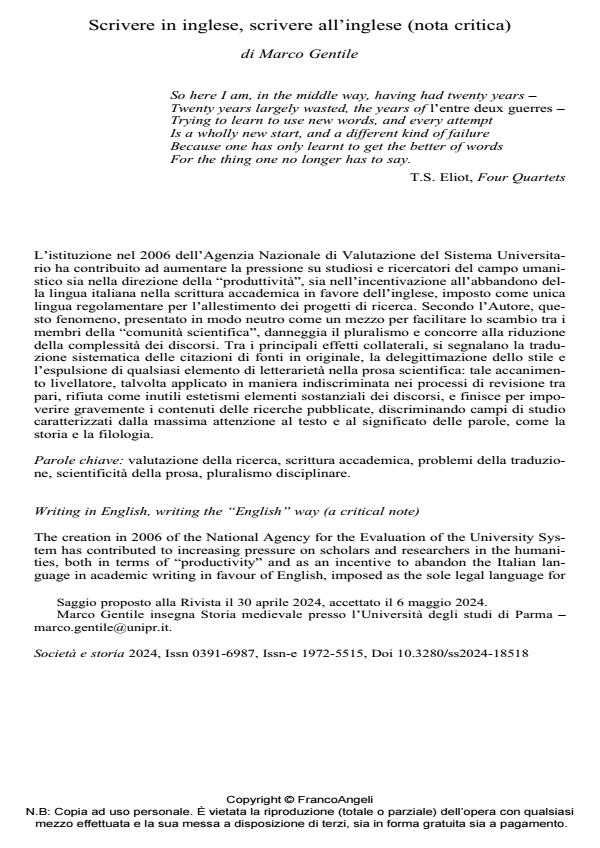Scrivere in inglese, scrivere all’inglese (nota critica)
Titolo Rivista SOCIETÀ E STORIA
Autori/Curatori Marco Gentile
Pubblicazione Online First 22/10/2024 Fascicolo 2024/186
Lingua Italiano Numero pagine 16 P. 1-16 Dimensione file 81 KB
DOI 10.3280/ss2024-18518
Il DOI è il codice a barre della proprietà intellettuale: per saperne di più
clicca qui
Qui sotto puoi vedere in anteprima la prima pagina di questo articolo.
Se questo articolo ti interessa, lo puoi acquistare (e scaricare in formato pdf) seguendo le facili indicazioni per acquistare il download credit. Acquista Download Credits per scaricare questo Articolo in formato PDF

FrancoAngeli è membro della Publishers International Linking Association, Inc (PILA)associazione indipendente e non profit per facilitare (attraverso i servizi tecnologici implementati da CrossRef.org) l’accesso degli studiosi ai contenuti digitali nelle pubblicazioni professionali e scientifiche
L’istituzione nel 2006 dell’Agenzia Nazionale di Valutazione del Sistema Universitario ha contribuito ad aumentare la pressione su studiosi e ricercatori del campo umanistico sia nella direzione della “produttività”, sia nell’incentivazione all’abbandono della lingua italiana nella scrittura accademica in favore dell’inglese, imposto come unica lingua regolamentare per l’allestimento dei progetti di ricerca. Secondo l’Autore, questo fenomeno, presentato in modo neutro come un mezzo per facilitare lo scambio tra i membri della “comunità scientifica”, danneggia il pluralismo e concorre alla riduzione della complessità dei discorsi. Tra i principali effetti collaterali, si segnalano la traduzione sistematica delle citazioni di fonti in originale, la delegittimazione dello stile e l’espulsione di qualsiasi elemento di letterarietà nella prosa scientifica: tale accanimento livellatore, talvolta applicato in maniera indiscriminata nei processi di revisione tra pari, rifiuta come inutili estetismi elementi sostanziali dei discorsi, e finisce per impoverire gravemente i contenuti delle ricerche pubblicate, discriminando campi di studio caratterizzati dalla massima attenzione al testo e al significato delle parole, come la storia e la filologia.
Parole chiave:valutazione della ricerca; scrittura accademica; problemi della traduzione;scientificità della prosa; pluralismo disciplinare
- Caffiero M. (2009), Esperienze, problemi, prospettive della ricerca storica in Italia: un punto di vista. Intervista a Roberto Bizzocchi, in «Giornale di Storia», 2, url: https://www.giornaledistoria.net/saggi/mestiere-di-storico/esperienze-problemiprospettive-della-ricerca-storica-italia-un-punto-vista-intervista-roberto-bizzocchi/, consultato il 22/3/2024.
- Calvino I. (1982), Tradurre è il vero modo di leggere un testo, in Id., Saggi. 19451985, a cura di M. Barenghi, tomo II, Milano, Mondadori, pp. 1825-1831.
- Cameron A. (1976), Circus Factions. Blues and Greens at Rome and Byzantium, Oxford University Press, Oxford.
- Cannadine D. (2000), Class in Britain, Penguin Books, Londra.
- Cattaneo E., D’Alessandro A. (2018), La lingua della scienza, in «La Repubblica», 29 aprile, p. 24.
- Cerase M. (2018), In italiano, please! Istigazione all’uso della nostra lingua all’Università, Roma, Armando.
- Chittolini G. (1979), La formazione dello stato regionale e le istituzioni del contado. Secoli XIV e XV, Torino, Einaudi.
- Chittolini G. (1990), «Quasi-città». Borghi e terre in area lombarda nel tardo Medioevo, in «Società e storia», 47, pp. 4-26.
- Corazzol G. (2006a), Riflessioni e divagazioni a proposito di un libro, in Id., Pensieri da un motorino: diciassette variazioni di storia popolare, Mestre, Ass. Storiamestre, pp. 75-84.
- Corazzol G. (2006b), Florilegio di buoni consigli a uso degli studiosi di storia municipale estratti da L’Europa delle città di Marino Berengo, in Id., Pensieri da un motorino: diciassette variazioni di storia popolare, Mestre, Ass. Storiamestre, pp. 117-137.
- De Ruvo G. (2024), Genealogia del wokismo, in «Limes. Rivista italiana di geopolitica», n. 3 (marzo), pp. 263-274.
- Fox K. (2005), Watching the English. The hidden rules of English behaviour, Londra, Hodder and Stoughton.
- Giunta C. (2017), E se non fosse la buona battaglia? Sul futuro dell’istruzione umanistica, Bologna, il Mulino.
- Giunta C. (2018), Come non scrivere. Consigli ed esempi da seguire, trappole e scemenze da evitare quando si scrive in italiano, Torino, UTET.
- Grafton A. (1994), The note from de Thou to Ranke, in «History and Theory», 33, pp. 53-76
- Grafton A. (1997), The Footnote: a Curious History, Cambridge (Mass.), Harvard University Press.
- Graziosi A. (2015), La nuova questione della lingua in Italia, in G. Beccaria e A. Graziosi, Lingua madre: italiano e inglese nel mondo globale, Bologna, il Mulino, pp. 11-77.
- Heller J. (1961), Catch 22, New York, Simon & Schuster (trad. it. Comma 22, a cura di R. Ceserani, Milano, Bompiani 1963).
- Humboldt, W. von (1820), Über das Vergleichende Sprachstudium (trad. it. La diversità delle lingue, a cura di D. Di Cesare, Roma-Bari, Laterza 1993).
- Italia, P. (2014), Scrivere all’Università. Manuale pratico con antologia di testi, Milano, Mondadori Education.
- Lévi Strauss C. (1954), Razza e storia, in Id., Razza e storia. Razza e cultura, Torino, Einaudi 2002, pp. 3-50.
- Malinowski B. (1923), The problem of meaning in primitive languages, in The meaning of meaning: a study of the influence of language upon thought and of the science of symbolism, with an introduction by J.P. Postgate and supplementary essays by B. Malinowski and F.G. Crookshank, a cura di C.K. Ogden e I.A. Richards, Londra-New York, Kegan Paul, Trench, Trubner & co., Harcourt, Brace & co., pp. 296-336.
- Mastrocola P. e Ricolfi L. (2021), Il danno scolastico. La scuola progressista come macchina della disuguaglianza, Milano, La nave di Teseo.
- McCarthy M. e O’Dell F. (2010), Academic Vocabulary in use, Cambridge, Cambridge University Press.
- Santambrogio M. (2008), Manuale di scrittura (non creativa), Roma-Bari, Laterza. Tabacco G. (1974), Egemonie sociali e strutture del potere nel medioevo italiano, Torino, Einaudi.
- Tabacco G. (1989), The Struggle for Power in Medieval Italy. Structures of Political Rule, Cambridge, Cambridge University Press.
- Walker Bynum C. (2007), The P word, in «Perspectives on History. The newsmagazine of the American Historical Association», October 1st, url: https://www.historians.org/researchandpublications/perspectivesonhistory/october2007/thepword, consultato il 22/3/2024.
- Whorf B.L. (1956), Science and Linguistics, in Id., Language, Thought and Reality. Selected Writings of Benjamin Lee Whorf, a cura di J.B. Carroll, New York e Londra, The Technology Press of Massachusetts Institute of Technology and John Wiley & Sons, pp. 207219.
Marco Gentile, Scrivere in inglese, scrivere all’inglese (nota critica) in "SOCIETÀ E STORIA " 186/2024, pp 1-16, DOI: 10.3280/ss2024-18518